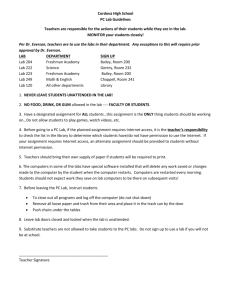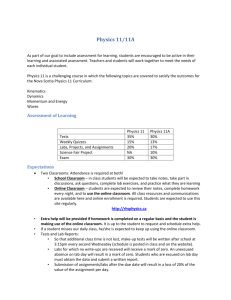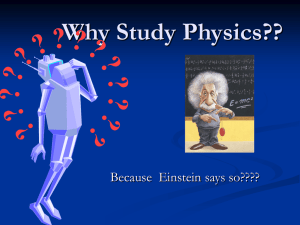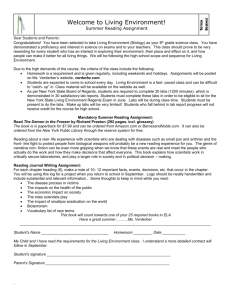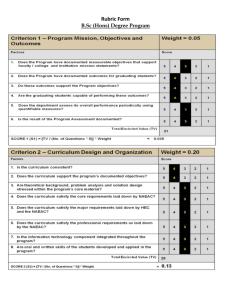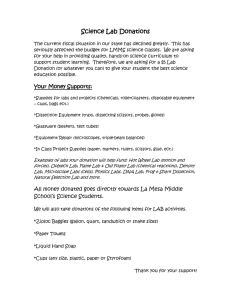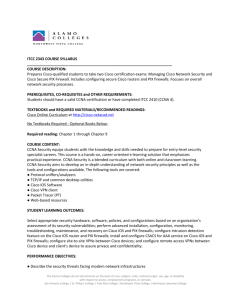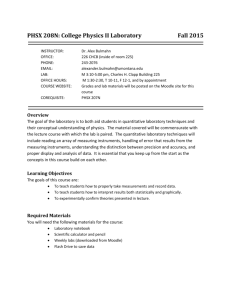ITCC 1401 - Alamo Colleges
advertisement
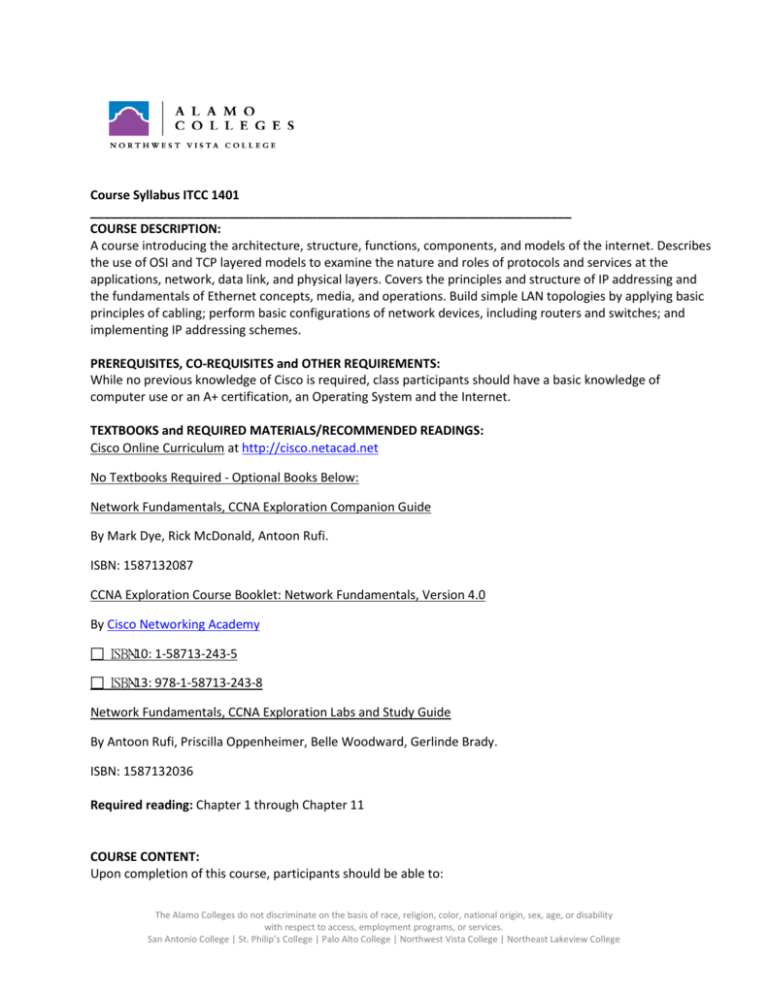
Course Syllabus ITCC 1401 ______________________________________________________________________ COURSE DESCRIPTION: A course introducing the architecture, structure, functions, components, and models of the internet. Describes the use of OSI and TCP layered models to examine the nature and roles of protocols and services at the applications, network, data link, and physical layers. Covers the principles and structure of IP addressing and the fundamentals of Ethernet concepts, media, and operations. Build simple LAN topologies by applying basic principles of cabling; perform basic configurations of network devices, including routers and switches; and implementing IP addressing schemes. PREREQUISITES, CO-REQUISITES and OTHER REQUIREMENTS: While no previous knowledge of Cisco is required, class participants should have a basic knowledge of computer use or an A+ certification, an Operating System and the Internet. TEXTBOOKS and REQUIRED MATERIALS/RECOMMENDED READINGS: Cisco Online Curriculum at http://cisco.netacad.net No Textbooks Required - Optional Books Below: Network Fundamentals, CCNA Exploration Companion Guide By Mark Dye, Rick McDonald, Antoon Rufi. ISBN: 1587132087 CCNA Exploration Course Booklet: Network Fundamentals, Version 4.0 By Cisco Networking Academy ISBN -10: 1-58713-243-5 ISBN -13: 978-1-58713-243-8 Network Fundamentals, CCNA Exploration Labs and Study Guide By Antoon Rufi, Priscilla Oppenheimer, Belle Woodward, Gerlinde Brady. ISBN: 1587132036 Required reading: Chapter 1 through Chapter 11 COURSE CONTENT: Upon completion of this course, participants should be able to: The Alamo Colleges do not discriminate on the basis of race, religion, color, national origin, sex, age, or disability with respect to access, employment programs, or services. San Antonio College | St. Philip’s College | Palo Alto College | Northwest Vista College | Northeast Lakeview College Identify the seven layers of the OSI model Describe the functions of each OSI layer Perform binary and hexadecimal conversion Develop IP address and subnet masking scheme Describe the proper selection of network cable and devices Describe wireless networking Install a local area network (LAN) Configure network devices and nodes Define the five steps of data encapsulation Identify the functions of the TCP/IP network-layer protocol STUDENT LEARNING OUTCOMES: Identify and describe internet architecture, structure, functions, components, and models; describe the use of OSI and TCP layered models; identify and describe the nature and roles of protocols and services at the application, network, data link, and physical layers; describe principles and structure of IP addressing and the fundamentals of Ethernet concepts, media, and operations; and build simple LAN topologies by applying basic principles of cabling, device configuration, and IP subnetting. PERFORMANCE OBJECTIVES: STUDENT SHOULD UNDERSTAND AND BE ABLE TO ANALYZE TCP/IP SUBNETTING STUDENT SHOULD UNDERSTAND THE VARIOUS CONCEPTUAL NETWORKING MODELS STUDENT SHOULD POSSESS THE CRITICAL THINKING SKILLS NECESSARY FOR NETWORK TROUBLESHOOTING STUDENT SHOULD BE ABLE TO PRODUCE AND READ BASIC NETWORK DRAWINGS STUDENT SHOULD UNDERSTAND THE CONCEPT OF NETWORK CONVERGENCE STUDENT SHOULD UNDERSTAND APPROPRIATE CABLING FOR LANS METHODS OF MEASUREMENT (grade requirements): Each chapter is followed with an Exam given online by the Cisco Academy System. The exams are graded by Cisco and scores are given immediately. Labs and study guides will be considered as a part of your attendance. Cheating, texting, IMing, and idly surfing the web will not be tolerated. Online Chapter Exams 10% Quizzes, Homework, etc 20% Online Final Exam Skill-Based Final Exam 25% 30% Daily Grade & Labs 15% 100% The Alamo Colleges do not discriminate on the basis of race, religion, color, national origin, sex, age, or disability with respect to access, employment programs, or services. San Antonio College | St. Philip’s College | Palo Alto College | Northwest Vista College | Northeast Lakeview College Semester Average NVC Grade Cisco Academy Status – Advance to next Academy Level 90 – 100 A A Pass – Advance to the next level 80 – 89 B B Pass – Advance to the next level 70 – 79 C C Pass – Advance to the next level 60 – 69 D F Fail Cisco Academy – Retake current level Below 60 F F Fail NVC and Cisco Academy ** NOTE: A successful Cisco Academy student will pass the Online Final Exam with a 70% or better grade and the Skills Based Final exam with an 80% or better. An opportunity to retake an alternate Skills Based Final Exam will be given, however, the grade for the second exam attempt will be reduced by 10% or 1 letter grade. GRADE APPEALS PROCESS: If a student has an objection to a grade received, the following is the process to dispute the grade and must be followed in this order: 1. 2. 3. 4. Informal resolution with the instructor Written appeal to the instructor Written appeal to the department chair Written appeal to the college committee STUDENT RESPONSIBILITIES: A. Attendance Effective Spring Term 2010, student absences will be recorded from the first day the class meets. Regular and punctual attendance in all classes and laboratories, day and evening, is required. Students who are absent for any reason should always consult with their instructors. Course syllabi must provide specific information regarding attendance, including, for courses involving the internet, online activity that constitutes “attendance.” Also, both tardiness and early departure from class may be considered forms of absenteeism. In all cases, students will be held responsible for completion of course requirements covered in their absence. Additionally, it is the student’s responsibility to drop a course for nonattendance. Course instructors establish policy with regard to attendance in their respective syllabi and may drop a student for excessive absences. Absences are considered excessive when more than 12.5 percent of The Alamo Colleges do not discriminate on the basis of race, religion, color, national origin, sex, age, or disability with respect to access, employment programs, or services. San Antonio College | St. Philip’s College | Palo Alto College | Northwest Vista College | Northeast Lakeview College the total contact hours of instruction in a semester, including lecture and lab, are missed. For example, in a three-credit-hour lecture class, students may be dropped after more than six contact hours of absences. In a four-credit-hour lecture/lab class, students may be dropped after more than eight contact hours of absences. Absences are counted regardless of whether they occur consecutively. In special programs with additional accreditation or certification standards, additional attendance requirements may be enforced but faculty must clearly explain these policies in their syllabi. Students who stop attending class for any reason should contact the instructor and the college registrar to officially withdraw from the class. Students may be required to consult with an advisor or designee before dropping. Failure to officially withdraw may result in a failing grade for the course. It is the student’s responsibility to withdraw officially from a class by submitting a completed Withdrawal Form to the Admissions and Records Office. ADDITIONAL INSTRUCTOR REQUIREMENTS: COLLEGE POLICIES: A. All of the Alamo Colleges are tobacco free. B. Alamo Colleges DPS Emergency Phone Numbers: Emergency Phone (210) 222-0911 General Phone (210) 485-0099 Weather Phone (210) 485-0189 (For information on college closures) Disability Access Statement – In accordance with the Americans with Disabilities Act (ADA) and Section 504 of the Rehabilitation Act, it is the responsibility of the student to self-identify with the campus Disability Services office. Only those students with appropriate documentation will receive a letter of accommodation from the Disability Services office. Instructors are required to follow only those accommodation and/or services outlined in the letter of accommodation. For further information, please contact the Disability Services office at (210) 486-4466 or visit the office located in the Cyprus Campus Center, Rm. 204. If you have specific needs, please discuss them privately with your instructor. GENERAL DESCRIPTION OF THE SUBJECT MATTER OF EACH LECTURE OR DISCUSSION: Week Chapters 1 Introduction, Ch 1 Lecture and Lab: Ch 2: Reading and Labs 2 Ch 2 Lecture & labs Ch 3 Lecture & labs 3 Ch 4 Lecture & labs Ch 5 Lecture & labs 4 Ch 6 Lecture & labs Ch 7 Lecture & labs 5 Ch 8 Lecture & labs Ch 9 Lecture & labs 6 Ch 10 Lecture & labs Ch 11 Lecture & labs 7 Skills Test Review & Final Exam Review The Alamo Colleges do not discriminate on the basis of race, religion, color, national origin, sex, age, or disability with respect to access, employment programs, or services. San Antonio College | St. Philip’s College | Palo Alto College | Northwest Vista College | Northeast Lakeview College 8 Final Exam and Practical The Alamo Colleges do not discriminate on the basis of race, religion, color, national origin, sex, age, or disability with respect to access, employment programs, or services. San Antonio College | St. Philip’s College | Palo Alto College | Northwest Vista College | Northeast Lakeview College
